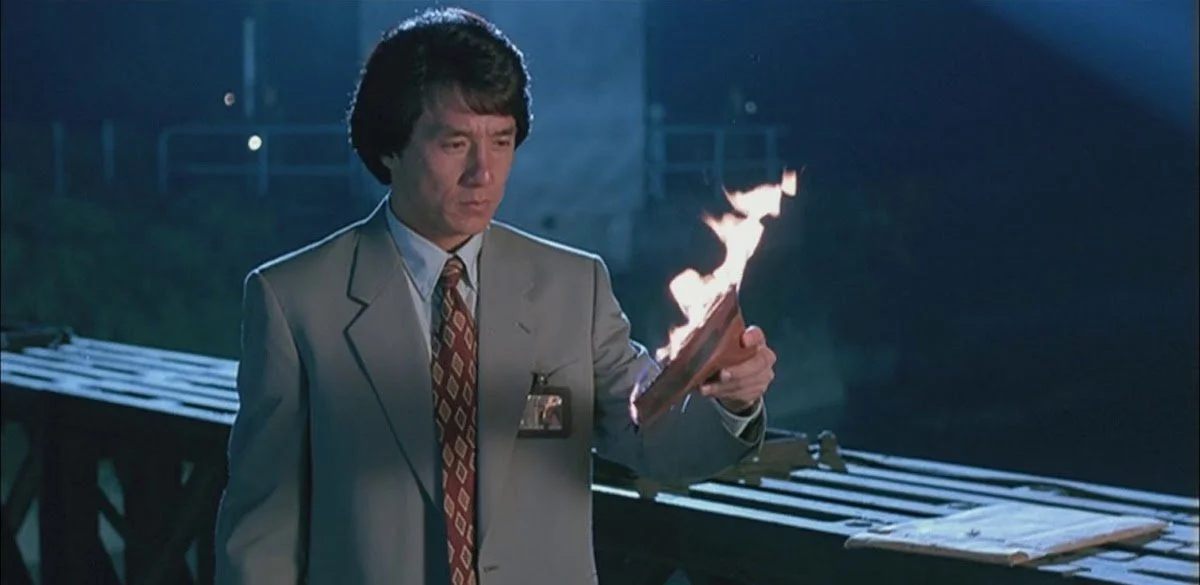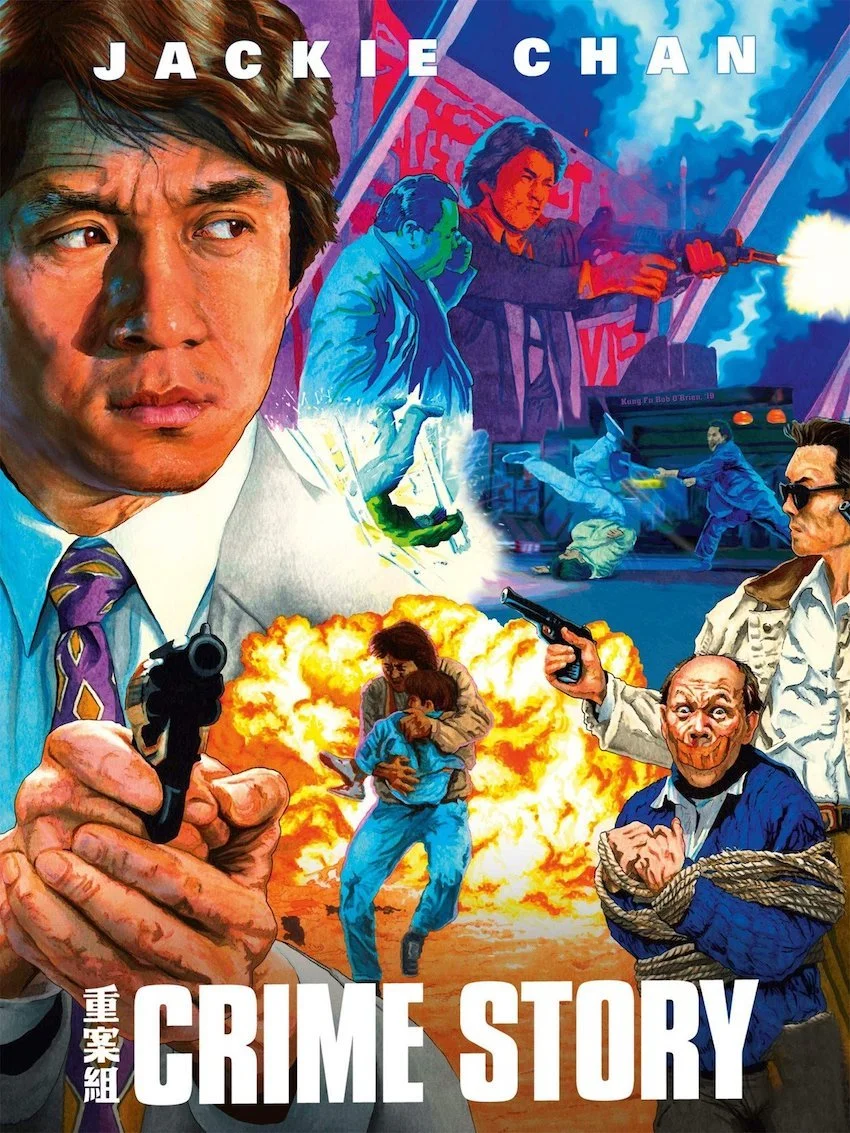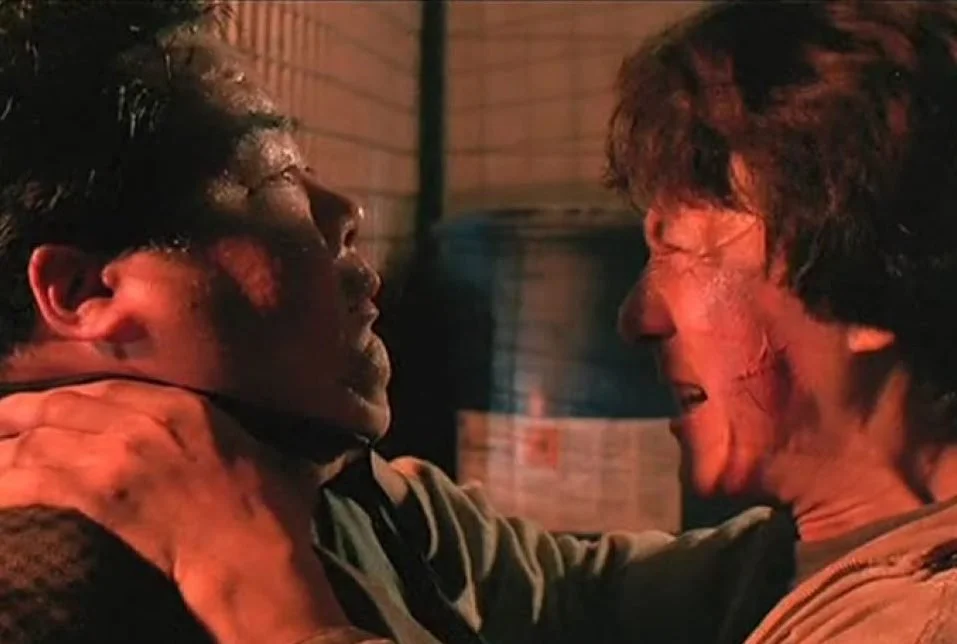The True Crimes of CRIME STORY (1993)
From January 17 through January 21, Neon Splatter is celebrating all things Jackie Chan. His movies, his many other projects, and his impact on film as well as film lovers. This is #JackieChanuary.
If you were to ask someone to imagine a gritty “based on true events” 1990s crime film with a determined, guilt-ridden cop at its center, they would picture any number of people in the lead role. Maybe they would think of a grizzled character actor or a dashing young star on the come up looking to showcase their range. The last person they would likely imagine is Jackie Chan. Yet in 1993, Jackie chose to branch out in an effort to show that his potential as a leading man was not limited to the martial arts comedies and adventure films that made him a superstar across Asia.
The project he chose for this was one that was initially funded to act as a moral (and public relations) booster for the haggard Royal Hong Kong Police, which makes sense when you consider that elements of his earlier POLICE STORY films were used in actual recruitment ads for the department due to their favorable portrayals of police heroism. The end result though was not quite the propaganda (“copaganda?”) piece that one would expect based on the project’s origins. Whether it was the numerous rewrites from the five different writers who worked on the script or the edgier sensibilities of director Kirk Wong, the finished film, CRIME STORY (aka JUNG ON JO/重案組 in Cantonese which roughly translates to “Major Crimes Unit”) is one of the darkest films of Jackie’s career.
We are first introduced to Jackie’s character in the film, Inspector Eddie Chan, when he arrives for a mandated psychological evaluation following a deadly shootout with a gang of fleeing bank robbers. It’s here in this scene that it becomes very apparent just how different CRIME STORY is from the other films Jackie was putting out during this time period. His character is tensely unreceptive to the questions about what happened being presented to him by the psychologist.
He acts as if everything is fine but the film flashes repeatedly to Eddie’s memory of the violent encounter illustrating just how haunted he is by it. On his own, out-matched, and out-gunned, Eddie used his quickness and wits to barely avoid being killed by the robbers’ hostile gunfire. In any other Jackie Chan film from this period, the scene would be a thrilling but fun endeavor with our hero nimbly flipping away from danger before comedically turning the tables on his aggressors.
Here though, the tone is much more harrowing as Eddie is not the acrobatic super-man the audience identifies Jackie as typically. He’s just a cop frantically trying to stay alive and squeeze off a few well-placed rounds from his police-issued revolver in hopes of taking the heavily armed criminals down before they hurt him or anyone else.
It has the mechanics of a Jackie Chan-constructed action scene, but Kirk Wong’s gritty directorial style combined with the somber and violent results called for by the story leave it feeling like something more akin to the “bullet ballets” popularized in Hong Kong cinema by the likes of director John Woo (HARD BOILED).
Eddie, clearly struggling with his brush with death, is determined to keep working through his emotional ordeal and his chance arrives when he becomes entangled in a kidnapping case where a wealthy land developer, Wong Yat-fei, is snatched off the streets in broad daylight in a violent altercation that left multiple police officers injured. Blaming himself for failing to stop the crime as it happened, Eddie becomes determined to find the criminals responsible and save Yat-fei.
This is where the “based on a true story” aspect comes into play. Three years before the release of CRIME STORY, a real-life kidnapping occurred in Hong Kong where a well-known land developer named Teddy Wang was forcibly abducted and his family extorted for several million dollars in hopes of having him returned safely. The film borrows heavily from the actual case details of the incident. For example, the way the kidnappers routed the ransom money through numerous international banks to avoid traces, how they hid their victim at sea to avoid detection, and (most exploitatively) even setting the kidnapping scenes on the actual spot where the crime occurred are all things that are present in CRIME STORY. The film also spends nearly all of its second act as more of a dramatized police procedural with Jackie confidently at the forefront.
This different tone and approach allowed Jackie to demonstrate early on that if he ever moved away from martial arts, he could headline a film without floundering. There are still “Jackie Chan” moments on display, but they are more restrained and spaced out—such as a foot chase and brawl that culminates on the bamboo scaffolding above a Peking opera performance or a set piece near the end of the film that sees him tumbling his way (both intentionally and otherwise) through a massive tanker ship where he believes the hostage is being held. Equally as much of the action though, like the shoot out in the early minutes of the film, are decidedly more violent and gun-centric than Jackie’s work normally is. It’s simply jarring to see the actor firing a submachine gun in a neon-soaked rooftop gun battle like some sort of surrogate Chow Yun-Fat.
Outside of a truly spectacular final set-piece that sees the infamous Kowloon Walled City literally blown up on camera (intercut with footage to make it appear as if the hero barely escapes the massive practical explosion in the kind of death-defying stunt work that Hong Kong films are known for—by outrunning numerous close-proximity fireballs down a lengthy hallway), the two action styles of Kirk Wong and Jackie just don’t mesh all that seamlessly in CRIME STORY despite being impeccably presented. It feels like even though Jackie wanted to branch out as a performer, and he was clearly capable to do so, he was not fully comfortable with the darker direction Kirk Wong wanted to take the film.
This has led many to speculate that Jackie actually reshot much of the action featured to make it fit better with his established brand of action filmmaking.
Wong has openly disputed this, including on a DVD commentary track for the film (released on disc by Dragon Dynasty), claiming that only small inserts shots and close-ups of Jackie were redone at the star’s insistence.
This appears to be true as Jackie’s hairstyle is noticeably different in multiple close-ups throughout the film but nowhere else and, in general, the look of all the action fits with Kirk Wong’s general visual style seen in later films like 1994’s ORGANIZED CRIME & TRIAD BUREAU.
The biggest (and strangest) divide between the two seems to be their recollection of any on-screen injuries Jackie had during filming. In his autobiography I Am Jackie Chan: My Life in Action, Jackie claims that his legs were severely broken on set during one of the many stunts where he was expected to dodge crashing vehicles.
Wong stated on that same commentary track that there were no serious injuries on set. Considering Jackie filmed and completed CRIME STORY on his off days while shooting CITY HUNTER (also released in 1993) with a completely different crew, it’s likely that Jackie was just engaging in some good-natured “print the legend” exaggeration in his book.
The drama didn’t end with just a clash between creatives though.
After the film was almost finalized and set to be released, the widow of Teddy Wang insisted that a happier ending be added to the film. In reality, while many of criminals responsible for his kidnapping were eventually arrested and jailed, Teddy Wang himself was never found. He was reportedly thrown overboard from the ship he was being held on as his captors tried to avoid being caught by the authorities. His body was sadly never recovered. Normally, family requests like those of his widow would fall on deaf ears from a film studio but she was a wealthy businesswoman who happened to own a large number of movie theaters throughout the island of Hong Kong.
A new ending was tacked on to the film that has Eddie Chan reuniting the couple at the very end and receiving a tearful “thank you” as a reward. It’s a bit jarring as the scenes of Teddy Wang’s fictional stand-in being weighted down and thrown to a watery grave are still present in the finished film. The fact that the character is actually alive is presented as a surprise for the audience. It’s never treated as anything but sincere though. So, while it is wish fulfillment, it doesn’t feel too incongruent with what came before in the story.
CRIME STORY ended up underperforming at the box office in its native Hong Kong. Local audiences were likely too familiar with the grim realities of the actual case to accept a version with a fairy tale ending and a more somber Jackie. The film did however receive favorable reviews and led to Jackie being honored with the “Best Actor” distinction at the 13th annual Hong Kong Film Awards. Despite this, Jackie stayed away from more serious acting roles for over a decade after the film’s release. He made several more films in that span- some were timeless classics, and some were entirely forgettable. It’s a shame though that there weren’t more films like this one where Jackie was at the height of his creativity and physicality but also willing to try new things with his on-screen persona. So, as it stands, CRIME STORY will forever be an oddity among his golden period of films—a fascinating clash of vastly different filmmaking sensibilities and true crime grit.









